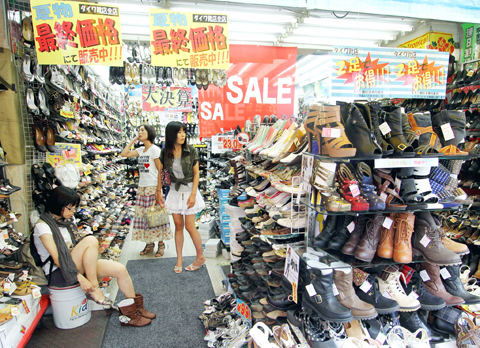Japan’s government released a mixed bag of economic indicators yesterday that did little to inspire confidence in the country’s fragile recovery.
The unemployment rate last month improved for the first time since January, but families made less money. Deflation persisted as consumer prices fell for the 17th straight month.
The latest numbers underscore growing uncertainty for Japan’s export-driven economy as it faces a surging yen and slowing global growth. In the April-June quarter, Japan lost its place to China as the world’s No. 2 economy after posting annualized growth of just 0.4 percent.

PHOTO: BLOOMBERG
Japanese Prime Minister Naoto Kan will probably unveil a new stimulus package soon, and growing political pressure is expected to prompt the central bank to ease monetary policy next month.
The nation’s seasonally adjusted unemployment rate improved to 5.2 percent from 5.3 percent in June, according to the Ministry of Internal Affairs and Communications. The result marked the first decline since January.
The number of jobless fell 7.8 percent from a year earlier to 3.31 million, while the number of those with employment stayed flat at 62.71 million.
Meanwhile, the country’s core consumer price index (CPI), which excludes fresh food, fell 1.1 percent from a year earlier. Lower prices may boost individual purchasing power, but deflation is generally bad for an economy. It plagued Japan during its “Lost Decade” in the 1990s, hampering growth by depressing company profits, sparking wage cuts and causing consumers to postpone purchases. It also can increase debt burdens.
The government’s new high school tuition breaks weighed heavily on the CPI, dragging education costs down 13 percent. A strong yen also pushed down prices of imported goods.
Retailers in heated competition for customers have been dropping prices to take advantage of the yen, which hit a fresh 15-year high against the dollar earlier this week. Major supermarket chains Ito-Yokado, Daiei and Aeon launched sales this month on imported products such as US pork and Australian beef.
The preliminary core CPI for Tokyo — considered a barometer of broader price trends — fell 1.1 percent in August, pointing toward another nationwide drop this month.
Kyohei Morita, chief economist at Barclays Capital Japan, does not expect the CPI to return to positive territory until mid-2012.
In a separate report, the ministry said average monthly household spending rose a real 1.1 percent last month. Monthly household income fell 1 percent to ¥562,094 (US$6,645).
Also See: Japan finds it has few options left in war against deflation

‘ABUSE OF POWER’: Lee Chun-yi allegedly used a Control Yuan vehicle to transport his dog to a pet grooming salon and take his wife to restaurants, media reports said Control Yuan Secretary-General Lee Chun-yi (李俊俋) resigned on Sunday night, admitting that he had misused a government vehicle, as reported by the media. Control Yuan Vice President Lee Hung-chun (李鴻鈞) yesterday apologized to the public over the issue. The watchdog body would follow up on similar accusations made by the Chinese Nationalist Party (KMT) and would investigate the alleged misuse of government vehicles by three other Control Yuan members: Su Li-chiung (蘇麗瓊), Lin Yu-jung (林郁容) and Wang Jung-chang (王榮璋), Lee Hung-chun said. Lee Chun-yi in a statement apologized for using a Control Yuan vehicle to transport his dog to a

BEIJING’S ‘PAWN’: ‘We, as Chinese, should never forget our roots, history, culture,’ Want Want Holdings general manager Tsai Wang-ting said at a summit in China The Mainland Affairs Council (MAC) yesterday condemned Want Want China Times Media Group (旺旺中時媒體集團) for making comments at the Cross-Strait Chinese Culture Summit that it said have damaged Taiwan’s sovereignty, adding that it would investigate if the group had colluded with China in the matter and contravened cross-strait regulations. The council issued a statement after Want Want Holdings (旺旺集團有限公司) general manager Tsai Wang-ting (蔡旺庭), the third son of the group’s founder, Tsai Eng-meng (蔡衍明), said at the summit last week that the group originated in “Chinese Taiwan,” and has developed and prospered in “the motherland.” “We, as Chinese, should never

‘A SURVIVAL QUESTION’: US officials have been urging the opposition KMT and TPP not to block defense spending, especially the special defense budget, an official said The US plans to ramp up weapons sales to Taiwan to a level exceeding US President Donald Trump’s first term as part of an effort to deter China as it intensifies military pressure on the nation, two US officials said on condition of anonymity. If US arms sales do accelerate, it could ease worries about the extent of Trump’s commitment to Taiwan. It would also add new friction to the tense US-China relationship. The officials said they expect US approvals for weapons sales to Taiwan over the next four years to surpass those in Trump’s first term, with one of them saying

INDO-PACIFIC REGION: Royal Navy ships exercise the right of freedom of navigation, including in the Taiwan Strait and South China Sea, the UK’s Tony Radakin told a summit Freedom of navigation in the Indo-Pacific region is as important as it is in the English Channel, British Chief of the Defence Staff Admiral Tony Radakin said at a summit in Singapore on Saturday. The remark came as the British Royal Navy’s flagship aircraft carrier, the HMS Prince of Wales, is on an eight-month deployment to the Indo-Pacific region as head of an international carrier strike group. “Upholding the UN Convention on the Law of the Sea, and with it, the principles of the freedom of navigation, in this part of the world matters to us just as it matters in the